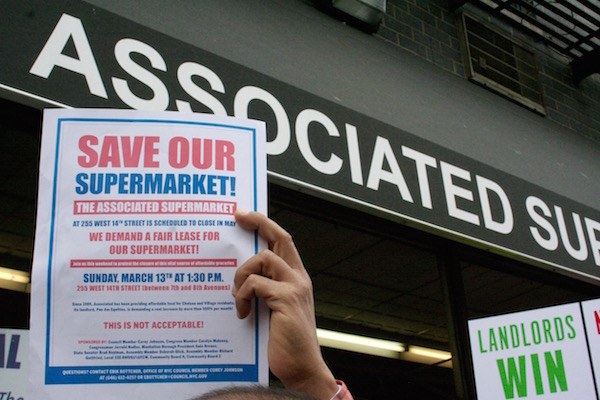BY LINCOLN ANDERSON | On the afternoon of Sun., Mar. 13, a crowd of around 100 neighborhood residents, joined by local politicians, rallied outside the Associated supermarket at 255 W. 14th St. after news broke that the market faces a triple rent hike that will price it out of the space.
Associated has been a staple at the spot for 27 years and, as a midlevel, affordable supermarket, serving both the Village and Chelsea, is deeply appreciated by a diverse mix of patrons. Seniors in particular, many on fixed incomes, rely on the grocery store in an ever-gentrifying part of Manhattan.
And that, of course, is the real issue. Gentrification is driving up rents, especially in Manhattan, particularly in areas like the Village and the rest of Downtown. Our neighborhoods are being radically transformed and our quality of life — our ability to simply live here — is suffering as the retail stores we depend on are being forced out again and again by the lease-renewal process.

The politicians at Mar. 13’s rally were sincere in calling for the property’s landlord to meet with them and try to reach terms under which the supermarket could stay. But, of course, any action in that direction — any lowering of the rent to something even remotely affordable for Associated — would be totally voluntary on the landlord’s part.
In short, the steady attrition of beloved local merchants will be an ongoing story — unless there is a dramatic change, and that will most likely include some form of legislation. This loss, if the Associated’s lease is not renewed, would be very deeply felt because of the supermarket’s oversized importance in the community. But even if this store is saved — and we sincerely hope it is — the larger problem of skyrocketing commercial rents still isn’t being addressed.
Both Community Board 2 and Councilmember Corey Johnson have organized online petitions to save the store, a terrific idea and more power to that effort. But again, will we be able to do that each and every time a critical store is threatened with being kicked out of its space?
Mayor Bill de Blasio, to his credit, has made the “affordability crisis” one of the key issues of his administration. He pulled off a real coup last year when the Rent Guidelines Board voted to approve a rent freeze for one-year lease renewals for rent-stabilized apartments. That vote was a relief to millions of rent-burdened New Yorkers. With de Blasio in the middle of his first term, we expect continued rent freezes — preferably rollbacks, as in a rent reduction. After all, as was clearly documented, landlords had unfairly profited from exaggerated operating-expense projections for years.
Yet, de Blasio, unfortunately, has not been as good on protecting small businesses, a cornerstone of the city’s affordability. The long-stalled Small Business Jobs Survival Act (SBJSA) bill has sat idly in the City Council for around 25 years. It’s no secret that the city’s powerful real estate industry doesn’t want it ever to come up for a vote. The SBJSA would create a system of nonbinding mediation and binding arbitration under which merchants would have a far better chance of negotiating fair lease renewals.
Previous Council speakers, including Christine Quinn, have blocked the SBJSA from being voted on, despite strong support for it among councilmembers. Now, under a new speaker, support has been building again for the bill — more than two dozen councilmembers are currently sponsors.
A year ago, Chelsea Now’s sister publication, The Villager, asked Speaker Melissa Mark-Viverito where things stood on the SBJSA and if councilmembers finally would be allowed to vote on it. She said the Council would have a hearing, maybe more than one, about small business survival that would look at all options, including the SBJSA.
To date, though, there has been no hearing. We again reached out to Mark-Viverito to ask what’s going on, but did not hear back by press time.
Maybe the SBJSA isn’t the perfect answer. Maybe it needs some tweaking. Perhaps there are some better options, ones that go beyond the mere tax breaks de Blasio and others mistakenly think will appease the landlords.
In short, this is a conversation we desperately need to have, involving all sides. Without addressing this issue, de Blasio’s affordability vision is deeply flawed. Speaker Mark-Viverito, it’s time to show guts and have that hearing you promised — and come up with real long-term solutions. Otherwise, we can only look forward to more desperate rallies and, sadly, a lot more store closings.
Lincoln Anderson is editor of Chelsea Now’s sister publications, The Villager and the East Villager.

































